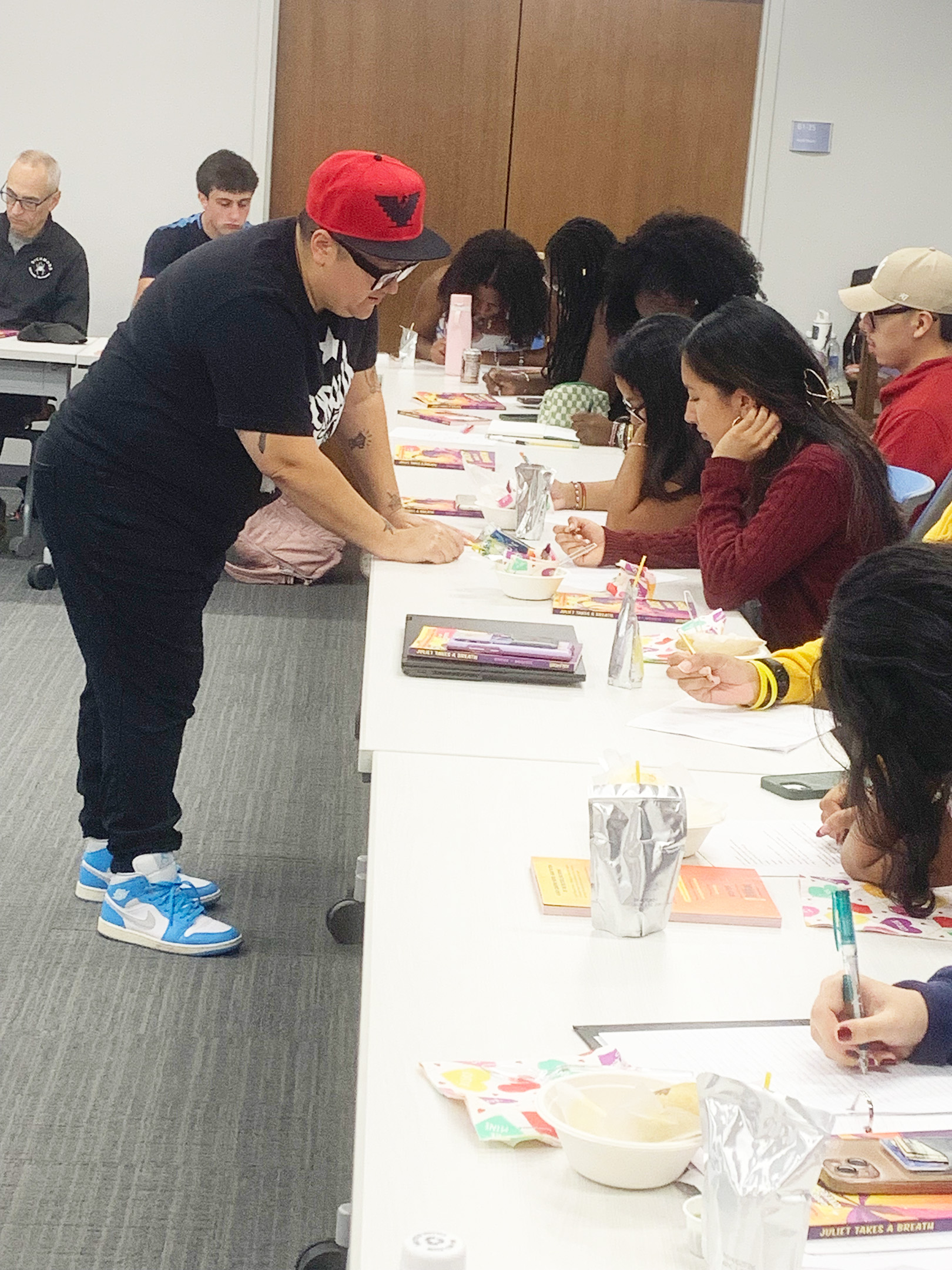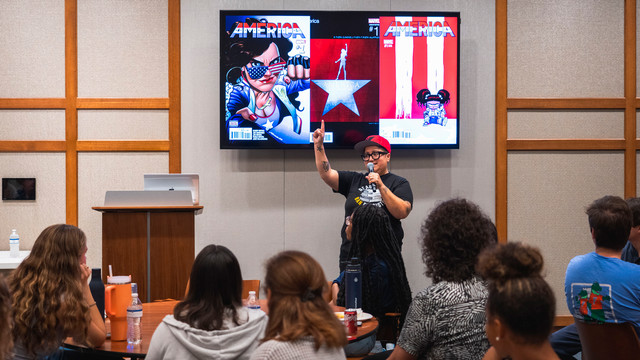Spiders imagine a better world
Campus Life
During a recent interactive workshop at Boatwright Library, over a dozen students put pen to paper as Gabby Rivera guided them through the process of inventing their own characters in a Superhero Creation Lab. Writing about superheroes provided “a place to grapple with justice and injustice,” she said.
Rivera, an author of Puerto Rican heritage, was recruited by Marvel about seven years ago to write a debut comic book about America Chavez, a college student/superhero who has the ability to punch star-shaped holes into portals and travel through time.
“Superheroes have been a ubiquitous part of storytelling and created a way for us to understand our universe for so long,” Rivera said. “Before Marvel, who were the superheroes? The gods and goddesses of mythology. They are full of human emotion.”
Crafting superhero traits
During the first part of the workshop, students were tasked to write for seven minutes. They created lists of actions, special abilities, and purpose a superhero might have.
“I included self-sacrifice for the greater good,” first-year student Moses Bailey said.
“Sticking up for those who can't or those who aren't confident enough to stick up for themselves,” offered Matthew Bellerby, also in his first year at UR. “It kind of brings me back to the older Spider-Man movies, where Toby Maguire is defending the nerdier people from the bullies, like Flash.”

Rivera asked them to contemplate what they believed in, and what justice would look like if it could be anything they wanted it to be.
“What’s the one thing you will fight for?” she asked.
Sophomore environmental studies major Gabrielle Lindsay, who has been working on a superhero book, said she would fight for those who are wrongly convicted of a crime. She imagined a mind-reading superpower that would reveal hidden evidence.
Some students drew from their own lives for superhero traits.
Senior leadership studies major Aida Lette envisioned a superhero with her people-pleasing tendencies. “The whole point of my power is that I can adapt to certain situations, but the more that I use my power, the more that I lose my sense of self,” Lette said.
“Do it, because that’s so good,” Rivera said, encouraging her to write the story. “When we dig into ourselves and our origin stories, when we go deep and get specific, that is where the magic and the power in our stories come in.”
Sophomore biochemistry and molecular biology major Nandita Hareesh, who volunteers at a hospital, sees many babies and children with life-threatening diseases, whose families struggle to get care because they aren’t insured. She imagined a superhero who could fix the healthcare system for the little kids and everyone else who needed it. Rivera said, “It breaks my heart that we need a superhero for that.”
Rivera explained why she named Chavez’s college after Sonia Sotomayor. “When I was unemployed and in my mom's basement writing, I watched as Sotomayor became the first Puerto Rican nominated to the Supreme Court,” she said. “That was unheard of. Out of this world.”
A template to follow
Rivera self-published her first novel, Juliet Takes a Breath, and sold it on the subway and on the streets. Word spread about her talent and she was eventually approached by an agent and followed by Penguin Random House, which republished her book in 2016. Two years later, Marvel came knocking.
Rivera explained the concept of a full-page splash, which is an opening single or double-page spread mainly featuring an image with minimal text.
“This one main image should be so startling and profound that it tells you a lot about the story and the character, and it fills you with a mood,” Rivera said.
She instructed the students that they could start their comic with a full-page splash, followed by a page with six panels. She said the six-panel template can be used across 12 pages to create a comic book.
“I find it really interesting that the superheroes that are being crafted here are folks that will literally make actual real life better, and not superheroes that are just kind of doing miraculous things in outer space,” Rivera said.
Rivera, who also gave a presentation to students earlier in the day, appeared as part of UR’s Latinx Heritage Month programming hosted by the Hub for Student Inclusion and Community.

